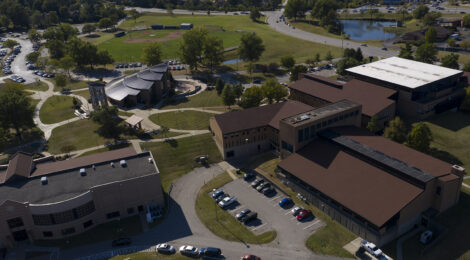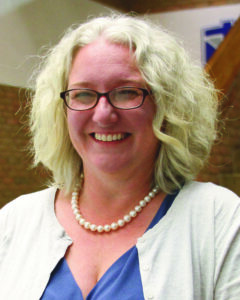
Vocation Work at Thomas More Drives Change in Learning Environment
In summer of 2022, Thomas More University received grant funding through the Network for Vocation in Undergraduate Education (NetVUE) to create a professional learning community (PLC) made up of eight faculty and staff, with a team of four leaders. PLC members include faculty Fr. Raymond Enzweiler, Ph.D. (department chair, theology), Ashley Gier (assistant professor, School of Nursing), Kimberly Haverkos, Ph.D. (dean, College of Liberal Arts & Social Sciences), Sr. Kathryn Kramer, S.D.P (assistant professor, School of Nursing), Kris Lovett, Ed.D. (assistant professor, business administration/economics), Ellie Megerle, M.S. (assistant professor, sociology & criminology), Caitlin Powell, Ph.D. (department chair, psychology), Whitney Pugh (assistant professor, psychology), and staff members Annabelle Bautista (dean, Student Diversity, Engagement, & Success), Kelly Bilz (librarian reference/government document), and Andrew Cole (director of Campus Ministry). The research completed and recommendations made by this group will affect how vocation is incorporated in and outside of the classroom environment at Thomas More. Below we share an update regarding the PLC given by Dean Kim Haverkos on the groundwork that has been done by the group. To read the original release on the NetVUE grant, CLICK HERE.
Judy Crist: I’d like to thank Kim Haverkos, dean of the College of Liberal Arts and Social Sciences for speaking with me about the work being done among the faculty and staff who are members of the Professional Learning Community (PLC) created thanks to the NetVUE grant received in summer 2022. Kim, I’m sure it’s been a big commitment, now that the group is halfway through can you share some insights?

Kim Haverkos: We are a little further than halfway, we have about five or six meetings left. Over the course of the academic year we’ve read three texts together. The first text is called “Relationship-Rich Education: How Human Connections Drive Success in College” by Peter Felten and Leo Lambert. The second is “Becoming a Student-Ready College: A New Culture of Leadership for Student Success” by Tia Brown McNair, Susan Albertine, Michelle Asha Cooper, Nicole McDonald, and Thomas Major Jr. We are reading currently “At This Time and In This Place: Vocation and Higher Education.” The goal of the grant was to develop this Professional Learning Community (PLC) and eventually get at least 50% of our faculty and staff to participate over time, not within this first year, but over time, because we felt that these three texts are so important that everybody should be reading them. One of the exciting things that we found, in terms of the vocation work, is that the way that the CIC (Council of Independent Colleges) and NetVIEW (Network for Vocation in Undergraduate Education) define vocation actually is our mission statement; they define vocation as the meaning of life, place in the world, and responsibility to others. I think that is really important for us doing this because as we’re looking at those three tenants, right: meaning of life, place in the world, and responsibility to others, then we come to how are we actually doing that? The text on vocation really is about how to help students find what they want to be doing with their life, the other two texts “Becoming a Student-Ready College” and “Relationship-Rich Education” is about how we, as the professors and staff here at Thomas More, make those things a reality.
JC: There is a question which I have had since the the grant was announced that you just answered. As a Catholic person, you look at vocation a little differently. You think of it in terms of, “am I going to become a religious or am I going to be a lay person?” And that’s not what this is at all. This is much larger, “what is your vocation in the world?”
KH: Yes, that’s the larger idea of vocation, now there is space for conversation around Catholic vocation but because this is CIC and NetVIEW together, we are trying to help students literally find what they want to do with their lives. They’ve expanded that definition outside of the Catholic realm, and they also wanted to include other faith-based groups in this conversation and so one of their other texts, which we have as a resource, talks about what it’s like to be a Muslim student searching for their vocation and what it means to be an evangelical person searching for vocation. We had a Jewish speaker at the conference that we went to, who talked about how they do that within that religious faith. It really is much larger or broader than the Catholic “are you going to be a lay person or a priest or a nun?”
JC: Tell me what you expect to have as deliverables, to drive results on campus?
KH: There is a plan for deliverables. Part of the outcomes is that the people who participate in the PLC have to have something that they will do in their classroom and track around these issues. It could be relationships, it could be student-ready versus college-ready, it could be vocation based. In FYE (First Year Experience – a required class for first year students), we already have Caitlin Powell (professor/instructor) asking questions around vocation and the students are doing a reflection. We’re hoping that over time, and perhaps in a senior capstone, we can come back to that question and have them answer again after their time here at Thomas More to look at the vocation impact, but also recognizing that becoming student-ready developing relationships are going to help them in that track.
I have been really, really impressed with the way that the faculty and staff have engaged with the texts and are already making changes in our classrooms, right now it’s just about the first three texts, we haven’t even gotten to the second set of texts but they’ve already changed their classrooms to do a better job in helping our students be successful. That, to me, is a successful PLC. I think we’re going to try for an extension grant so that we can continue the work.

Comments are closed, but trackbacks and pingbacks are open.